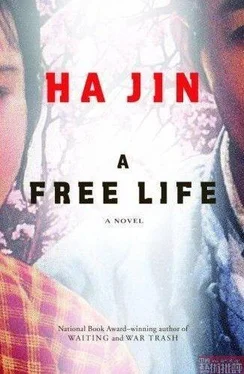In the meantime, Pingping had cut as many household expenses as possible so as to pay off the mortgage. In the winter, during the day she wouldn't turn on the heat to warm the whole house and instead put a column radiator in the dining room, where Taotao did his homework. In the summer she shut off the wall registers in the living room and her own bedroom so that the air-conditioning would start up less frequently. She cooked as rarely as possible at home. If Taotao didn't go to the restaurant for dinner, she'd bring back something for him. He was allowed to stay home in the evenings, but he mustn't use his computer for more than one hour a day. Pingping also saved on taxes. She even filed their son as a part-time employee (the boy did do some kitchen chores) and claimed he had earned two thousand dollars the past year. Nan often joked with his wife, saying, "I'm a fork that rakes in money while you're a box that holds money. It doesn't matter much if the fork loses a tine, but it will be a disaster if the box has a hole."
She would say, "I scrimp and save for you, not for myself. Don't make fun of me." That was true; she had never bought a single item of new clothing for herself.
In December 1995, they sent Mr. Wolfe the final big check and asked for the title to their house, which the old man mailed them two weeks later. At last they had put their feet on the ground they could call their own. Confidence surged in Nan, who had finally earned the security for his family, and a kind of elation possessed him for a month or so. Now, even if the restaurant went under, his family would be safely sheltered. As long as he did some work, he could easily bring food home. This is freedom, he reasoned: not owing anybody a penny and having no fear of being fired.
But his joy was short-lived. Somehow he was puzzled by the home ownership, which he hadn't expected to come true in less than five years. He remembered A House for Mr. Biswas and still could feel for the protagonist, a small man whose lifetime struggle was to have his own roof. But here in Georgia, where land was cheap and realty in a buyer's market, he hadn't had a prolonged struggle for owning a home at all. In a way he wished this miracle had taken place in Boston or San Francisco or New York City, where one could claim success by owning a house. But here most people who worked hard could eventually become a home owner. Then his former neighbor Gerald came to mind, reminding him that there were a lot of losers even in Georgia and that he ought to be grateful.
Nevertheless, as time went by, a kind of disappointment sank into his heart. The struggle had ended so soon that he felt as though the whole notion of the American dream was shoddy, a hoax. In his mind he wrestled with the bewilderment that had begun to enervate him and made him work less hard than before. He tried to convince himself that the house was really theirs, and so were the van and the restaurant, that the realized dream wasn't merely an empty promise. If his family hadn't come to America, he couldn't have imagined owning these things, not in his wildest expectations. He was baffled, wondering what was wrong with him. Why couldn't he be as happy as his wife? Why couldn't he enjoy the fruits of their hard labor? He should feel successful. But somehow the success didn't mean as much to him as it should.
Gradually he figured out what had happened-in just a few years he'd gone through the journey that often took most immigrants a whole lifetime. Usually the first generation drudged to feed and shelter themselves and their families, and toward the end of their lives they might own a house or an apartment, and if they were more fortunate, a business. Their children, having grown on the bases the parents had built, would have different kinds of dreams and ambitions, going to college and becoming professionals and "real Americans." Most of them wouldn't repeat their parents' lives. In other words, the first generation was meant to be wasted, or sacrificed, for its children, like manure used to enrich the soil so that new seeds could sprout and grow.
But Nan was merely forty, and still had many years of life ahead. What should he do next? Work hard to acquire another business? Absolutely not. Of that he was certain. He didn't want to die a successful businessman.
Nan remembered the credo he had repeated to Danning six years before: Do something moneyed people cannot do. The memory occasioned a sudden pang in his heart. It seemed that he had forgotten his goal and gotten lost in making money. Why hadn't he devoted himself to writing poetry? Instead, all these years he had been working like a brainless machine. He tried to convince himself that this "detour" might be a necessary procedure, a step toward some achievement of higher order, since logically speaking, only after you were fed and sheltered could you mull over ideas and enjoy the leisure needed for creating arts. Yet his disappointment wouldn't abate, its heaviness weighing down his mind.
He couldn't help fulminating against himself mentally. "You've been living like a worm and exist only in the flesh. You're just a channel of food, a walking corpse." He was so irascible these days that his wife and son again avoided eating with him at the same table.
SHUBO often came in to give Nan World Journal after he himself had read it. If the restaurant wasn't busy, the two of them would chat at length. One afternoon, Nan told his friend that he should have spent more time writing poetry, Shubo shook his balding head and said, "You're too impractical."
"Why should I be practical?" countered Nan. "The world has been created by impractical people."
"I mean, you shouldn't bite off more than you can chew."
"If you speak Chinese, you don't need to mix in English idioms. When did you learn that expression, yesterday?" Nan felt his temper rising.
"See, that's exactly your problem," Shubo said, and took a swallow of oolong tea.
"What are you getting at?"
"You're impatient and always talk and act as if your bottom were on fire."
Nan hated that expression and asked, "What do you mean by 'impatient'?"
"We're new here and cannot go a million miles in one life. Writing poetry can be a profession only for your grandchildren. For example, I don't think Taotao will write poetry. You want him to study science to earn a meal ticket, don't you?"
" Maybe, but that has nothing to do with my life. "
"Forget about your life. You're supposed to sacrifice yourself for your children, who are an extension of your life and who will do the same for their children. That's how we Chinese survive and multiply-each generation lives for the next."
"That's why children must be filial to their parents, isn't it?"
"Yes."
"Guess what, I don't buy into that crap. Why should I sacrifice myself? I'm done sacrificing-I've had enough. Besides, 'sacrifice' is just an excuse for our cowardice and laziness. My son has his life and I must have mine." Nan wanted to remind Shubo that he didn't even have a child and was unqualified to talk about parental sacrifice, but he held back.
" Nan, you're too impatient. In your life span you want go through the course of three generations. You'll be better off if you scale down your ambition. If you really want to write, do it in Chinese. That will be more reasonable."
"I don't want to be reasonable," sneered Nan. "We're too often emasculated by reason and pragmatism."
"We shouldn't continue talking like this, going in circles. All I'm saying is that one must be financially secure first and then think about making arts or writing books. In other words, it takes generations for the immigrants to outgrow the material stage."
"That's a philistine mentality," said Nan.
"No, it's the American way. Remember, Ben Franklin's father forbade his son to be a poet, saying most verse makers were just beggars?"
Читать дальше












